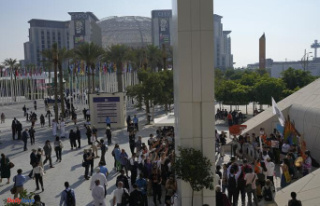Guinea-Bissau President Umaro Sissoco Embalo decided, Monday, December 4, to dissolve the Parliament dominated by the opposition, three days after armed clashes that he describes as an “attempted coup d’état” and which plunged this small country of West Africa in yet another crisis. The dissolution of Parliament calls for elections to be held on a date that is still uncertain, despite the deadlines prescribed by law. Domingos Simoes Pereira, President of Parliament and longtime opponent of Mr. Embalo, denounced a “constitutional coup” on the part of the latter.
“The date of the next legislative elections will be set at the appropriate time, in accordance with the provisions (…) of the Constitution,” says a presidential decree communicated to the press. Voters in this country facing chronic instability already voted six months ago, after Mr. Embalo, president since 2020, dissolved Parliament, “a space for political guerrilla and conspiracy,” in his words.
Mr. Embalo also announced upon leaving a brief extraordinary council of ministers that he was retaining Geraldo Joao Martins as prime minister, but was taking over the security portfolios of defense and interior.
Corruption and drug trafficking
Guinea-Bissau, a Portuguese-speaking country of 2 million inhabitants, one of the poorest in the world and considered one of the most plagued by corruption, has gone from putsch to armed coup since its independence from Portugal in 1974. or policies. In February 2022, Mr. Embalo escaped a putsch, which he presented as linked to drug trafficking.
Thursday evening and Friday morning, clashes took place between the National Guard and the army, leaving at least two dead in the capital, Bissau. “After this attempted coup d’état led by the National Guard and in the face of strong evidence of the existence of political complicity, the normal functioning of the institutions of the Republic became impossible. These facts confirm the existence of a serious political crisis,” the president said in the decree dissolving Parliament.
The clashes began when elements of the National Guard burst into the premises of the judicial police on Thursday evening to extract the Minister of Economy and Finance, Souleiman Seidi, and the Secretary of State for the Public Treasury, Antonio Monteiro, who were interrogated there. Then they were sheltered in a military camp in the capital, and resisted with arms until Friday morning.
These clashes are considered a new illustration of the deep political fractures at the heart of the State and which also run through the security forces. The National Guard essentially reports to the Ministry of the Interior, and therefore to the government, itself an emanation of Parliament dominated by the opposition. The prosecution, which ordered the arrest of the two members of the government, responds to the presidency.
Withdrawal of $10 million
The June legislative elections gave an absolute majority to a coalition formed around the historic African Party for the Independence of Guinea and Cape Verde (PAIGC), an old adversary of President Embalo, who thus found himself condemned to a complicated cohabitation with the government.
In his decree, the president denounces "the passivity of the government" in the face of the latest events, and assures that the goal of the National Guard was to obstruct the investigations carried out by the prosecution. The two members of the government were taken into custody on Thursday and questioned in connection with a withdrawal of 10 million dollars (9.23 million euros) from state coffers. The matter had previously been discussed in Parliament.
Mr. Embalo accuses the Assembly of having “preferred to defend members of the executive suspected of acts of corruption” rather than “exercising its role of control” of the government. Its president tried to continue the session, which ended up being short. He challenged the legality of a dissolution so soon after the elections, and called it a “constitutional coup.” Some young people burned tires in a street near Parliament, noted an AFP correspondent.












